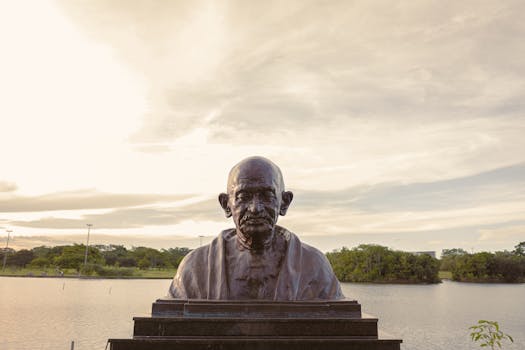Mahatma Gandhi: The Father of Nonviolent Resistance

Known as the Father of Nonviolent Resistance, Mahatma Gandhi's influence on the global stage is immeasurable. He pioneered the philosophy of Satyagraha, a form of nonviolent protest, which became a powerful tool in the fight for civil rights and freedom across various nations. His leadership during India's struggle for independence from British rule inspired countless movements around the world, emphasizing the power of peaceful resistance.
Early Life and Influences
Mahatma Gandhi was born on October 2, 1869, in Porbandar, a coastal town in present-day Gujarat, India. His full name was Mohandas Karamchand Gandhi. From an early age, Gandhi was deeply influenced by his mother's devotion and his father's ethical conduct. These early lessons in morality would shape his lifelong commitment to truth and nonviolence.
Gandhi's education took him to England in 1888 to study law at University College London. During this period, he was exposed to various religious and philosophical texts that broadened his perspective. The teachings of Jesus Christ, Leo Tolstoy, and Henry David Thoreau played significant roles in shaping his approach to social and political issues.
After completing his studies, Gandhi returned to India briefly before moving to South Africa in 1893 to work as a legal representative for an Indian firm. It was in South Africa that he faced racial discrimination firsthand, an experience that galvanized his resolve to fight for social justice through nonviolent means.
The Birth of Satyagraha
In South Africa, Gandhi developed the concept of Satyagraha, which translates to "truth force" or "soul force." This philosophy advocates for passive resistance as a way to bring about social and political change. Gandhi's Satyagraha movement aimed to address the injustices faced by the Indian community in South Africa.
One of the first major campaigns under this philosophy was against the Black Act, which required all Indians in South Africa to carry registration documents. Gandhi organized mass protests and encouraged people to defy the law peacefully. His efforts were met with imprisonment and violence, but they eventually led to negotiations and some concessions from the government.
Satyagraha became a cornerstone of Gandhi's approach upon his return to India in 1915. He employed this method in various campaigns against British colonial rule, including the Non-Cooperation Movement (1920-1922), the Salt March (1930), and the Quit India Movement (1942).
Significant Movements in India
- Non-Cooperation Movement (1920-1922): This movement sought to resist British rule through nonviolent means such as boycotting British goods and institutions. It gained widespread support but was eventually suspended after violent outbreaks.
- Salt March (1930): Also known as the Dandi March, this 240-mile journey protested the British monopoly on salt production and sales. It was a pivotal moment in India's independence struggle.
- Quit India Movement (1942): Launched during World War II, this movement demanded an end to British rule in India. Despite severe repression by the British authorities, it mobilized millions of Indians and intensified calls for independence.
Legacy and Global Impact
Mahatma Gandhi's philosophy of nonviolent resistance transcended national boundaries and inspired global leaders such as Martin Luther King Jr., Nelson Mandela, and Aung San Suu Kyi. His teachings continue to resonate with activists seeking peaceful solutions to social and political challenges worldwide.
Gandhi's impact is evident in various civil rights movements that have adopted nonviolent methods. For instance, Martin Luther King Jr.'s leadership during the American Civil Rights Movement drew heavily from Gandhi's principles. King visited India in 1959 to deepen his understanding of Satyagraha and applied these lessons in his fight against racial segregation in the United States (ted.com).
Moreover, Nelson Mandela credited Gandhi's influence on his own struggle against apartheid in South Africa. Mandela acknowledged that Gandhi's approach provided a moral framework for resisting oppression without resorting to violence.
| Movement | Year | Objective | Outcome |
|---|---|---|---|
| Non-Cooperation Movement | 1920-1922 | Boycott British goods and institutions | Suspended after violent outbreaks |
| Salt March | 1930 | Protest British monopoly on salt production | Pivotal moment in India's independence struggle |
| Quit India Movement | 1942 | Demand an end to British rule | Mobilized millions despite repression |
Gandhi's Philosophy
Mahatma Gandhi's legacy as the Father of Nonviolent Resistance continues to inspire people around the world. His philosophy of Satyagraha has proven effective across various contexts—from India's fight for independence to modern civil rights movements globally.
The principles he championed remain relevant today, offering a blueprint for peaceful resistance against injustice. Through his life's work, Gandhi demonstrated that true strength lies not in physical might but in unwavering commitment to truth and nonviolence.